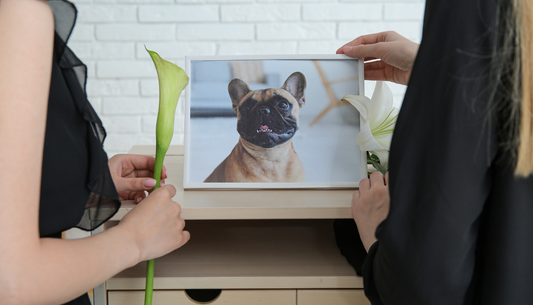
Pet Afterlife Beliefs: What Different Faiths Say About Pets in Heaven.
When a pet's collar falls silent, a big question emerges: do pets go to heaven? This article explores what pastors, rabbis, imams, and teachers say. It's not a definitive answer but a guide to hope.
Thor Madsen from Midwestern Baptist Theological Seminary says the Bible doesn't directly talk about pets in heaven. Yet, he believes the essence of heaven is being with God. Catholic leaders, like Rev. John Schmeidler, look to St. Thomas Aquinas and St. Francis of Assisi for insights. They suggest God might bring back pets for our joy.

Muslim scholar Abdalla Idris Ali notes the Qur'an doesn't explicitly mention an animal afterlife. Yet, it promises paradise with "everything they have asked for." Rabbi Scott White imagines a future where humans and dogs are together again. Northern Cherokee spokesperson Gary Langston believes in a world where spirits continue in another form.
Hindu and Vedanta teachers Anand Bhattacharyya and Linda Prugh believe animals have souls and go through reincarnation. The Mahabharata's story of Yudhisthira and his dog celebrates loyalty and welcome. Buddhist teacher Marnie Hammer says, "I don't know," but encourages us to focus on being present and compassionate.
Other Christian groups also offer hope. Lutherans say "maybe," Presbyterians dream of a world where animals and humans live together again. The Church of Jesus Christ of Latter-day Saints believes animals have spirits and will be redeemed through Christ. Biblical stories of Eden, Isaiah's kingdom, and Romans 8's promise of freedom add to the hope.
Though Pet Afterlife Beliefs vary, they all open up space for love, mercy, and restoration. This space allows us to wonder, with respect and bravery, if pets go to heaven. It helps us cherish our pets and keep their memories alive with love.
Why Pet Afterlife Beliefs Comfort Us During Loss
Grief makes us question things we can't answer. In the quiet hours after saying goodbye, we often turn to stories. These tales of a peaceful meadow or a reunion help ease our pain. They offer pet loss and grief support when words fail us.

The emotional and spiritual bonds we share with companion animals
Carolyn Sharp's story of holding a greyhound in her final moments shows the depth of our bond. This tenderness touches our hearts and souls, leading us to share pet heaven stories of peace and reunion. Interfaith chaplain Jack Vinyardi believes these bonds never truly end, a feeling many share when coping with pet loss.
These bonds inspire hope shaped by faith. Patricia Cox's words, “If God knows the fate of a sparrow…,” remind us of God's care for our pets. This quiet trust offers gentle pet bereavement support when we're most in pain.
How beliefs shape coping with pet loss and pet bereavement support
Beliefs guide us through mourning. Rabbi Scott White's Jewish reflections focus on virtue and love, helping families find meaning in life after pet loss. Islamic teachings, as shared by Abdalla Idris Ali, suggest paradise granting our wishes, opening up the possibility of reunion without strict claims. These beliefs help us coping with pet loss.
Scripture also provides language for our grief. Themes like Eden's harmony and the restoration in Romans 8 help us tell pet heaven stories. These stories and themes are used in pet loss and grief support to honor both faith and feeling.
Honoring a beloved pet while keeping memories alive
Keeping bonds alive can be healing. Many Native American teachers, like Gary Langston, believe spirits move to another dimension but companionship remains. This view makes it okay to hold onto memories and shapes remembrance rituals for pets that comfort us.
Buddhist wisdom from Marnie Hammer encourages living in the present with compassion. Lighting a candle or sharing pet heaven stories in a circle combines mindfulness with pet bereavement support. It helps families cope with life after pet loss in a way that's both tender and real.
Christian Perspectives: Protestant, Catholic, and Other Denominations on Do Pets Go to Heaven
Christians wonder if pets go to heaven with hope and care. Different traditions offer various answers, ranging from caution to joy. These beliefs aim to honor a beloved pet and keep memories alive.

Protestant views stressing heaven’s fulfillment in God’s presence
Many Protestants believe heaven is complete in God’s presence. Theologian Thor Madsen says Scripture doesn't clearly promise pet resurrection. Yet, God fulfills every longing, making nothing feel missing in the future.
Some Protestants share gentle hope through stories of pet heaven. These stories express trust in God’s goodness. They don't promise certainty but help in keeping memories alive during grief.
Catholic teaching, Aquinas and Francis of Assisi, and hope for restored creation
Catholic voices blend doctrine with pastoral hope. Thomas Aquinas taught that animals have souls unlike human souls. St. Francis of Assisi urged love for every creature, honoring a beloved pet and the wider creation.
Writers like Michelle Arnold and Richard Geraghty note the Catechism's silence on pets. They point to a restored creation in Christ, where creatures may share in renewal. Some believe God could include beloved animals in perfect joy.
Lutheran and Presbyterian cautions and possibilities for animals in a renewed earth
Lutheran sources, including the Lutheran Church—Missouri Synod, offer a cautious maybe. Pastor-scholars like John Brug suggest the new earth could include animals as the first earth did.
Presbyterian writers reason that Eden’s original harmony implies animals belong in God’s renewed world. These views nurture pet afterlife beliefs rooted in Scripture’s promise of a healed creation.
Biblical themes: Eden, Isaiah’s peaceable kingdom, and Romans 8 restoration
Genesis portrays animals in Eden alongside humankind. Isaiah 11:6–9 and 65:25 paint a peaceable kingdom where wolves and lambs rest together and children walk safely. Romans 8:20–21 promises creation’s freedom from decay.
The Flood narrative shows God’s care for creatures, and Revelation speaks of a new heaven and new earth. These themes sustain pet heaven stories that comfort mourners and guide honoring a beloved pet with faith-filled practices.
Other Christian traditions contribute to this picture. Jehovah’s Witnesses speak of a peaceful earthly paradise with animals. Seventh-day Adventists urge esteem and protection for all creatures. The Church of Jesus Christ of Latter-day Saints teaches that animals have spirits and will be saved through Christ’s Atonement. Together, these streams keep the question do pets go to heaven open to hope while keeping memories alive.
| Tradition | Core View | Biblical or Theological Anchor | Pastoral Implication |
|---|---|---|---|
| Protestant (Evangelical) | Fulfillment in God’s presence; no clear promise of pet resurrection | Emphasis on God’s sufficiency; no explicit text assuring pet afterlife | Offer comfort without guarantees; share pet heaven stories with care |
| Catholic | Animals have non-rational souls; hope in restored creation | Aquinas; St. Francis; creation renewed in Christ | Encourage honoring a beloved pet and keeping memories alive in prayer |
| Lutheran | Cautious maybe; animals likely on the renewed earth | Continuity between first creation and new creation | Console with hope rooted in God’s renewal of all things |
| Presbyterian | Logical place for animals in God’s renewed world | Eden’s pattern; promises of peace in Isaiah | Use Scripture’s vision to support gentle grief practices |
| Jehovah’s Witnesses | Peaceful earthly paradise including animals | Prophetic images of a restored earth | Frame hope around life on a renewed earth with animals |
| Seventh-day Adventist | High esteem and moral duty toward animals | Creation care and stewardship themes | Honor pets by compassionate living and remembrance |
| Latter-day Saint | Animals have spirits; saved through Christ’s Atonement | Teachings on a celestial kingdom that includes creatures | Support pet afterlife beliefs with hope in redemption of all life |
Jewish, Muslim, and Native Views on Animals in the Afterlife
Many traditions believe that love never truly ends. They offer gentle ways to keep memories alive and honor pets. These teachings help us find meaning after losing a pet, without needing to know for sure.
Jewish emphasis on virtue, love returning to God, and companionship in the world to come
Rabbi Scott White says God has a special place for the virtuous in the afterlife. If a pet helped someone become kinder, their bond could be part of that holiness. Many Jews believe that all love comes from God and returns to God, which includes animals.
These beliefs make pet heaven stories meaningful. They encourage us to be kind and remember our pets through prayer and charity. Simple rituals can also honor the good a pet brought into our lives.
Muslim insights: paradise granting all one asks and divine justice for creatures
Scholar Abdalla Idris Ali points out the Quran doesn't directly talk about an animal afterlife. But paradise promises to give us everything we've asked for, leaving room for reunions. A teaching on divine justice shows that God cares about all creatures.
These insights support humble and hopeful pet afterlife beliefs. They encourage us to honor our pets with charity and share stories of pet heaven. These stories help families cope with the loss of a pet.
Native American beliefs on interconnection and spirits moving into another dimension
Gary Langston shares a Northern Cherokee view: all living beings are connected as children of the Earth. Animal spirits move into another dimension, where human and pet friendships can be reunited in spirit form.
This belief in kinship makes remembering pets a community effort. Storytelling, songs, and quiet prayer in nature are ways to honor pets. They help weave life after pet loss into the larger tapestry of life and love.
Eastern Traditions: Hindu/Vedanta and Buddhist Reflections
In Asia, pet afterlife beliefs are woven with respect, stories, and practices. These beliefs help people cope with pet loss by focusing on love and daily kindness. Families often honor their pets through stories and rituals that keep their memories alive.
Hindu and Vedanta teachings on animal souls, reincarnation, and the Mahabharata’s faithful dog
In the Mahabharata, Yudhisthira wants his dog in heaven with him. Anand Bhattacharyya's retelling highlights loyalty and acceptance. It shows that love should never be left behind.
Hindu beliefs say animals have souls and go through reincarnation. They evolve towards becoming human, where they can unite with the Divine. Linda Prugh from the Vedanta Society says animals lack full moral understanding but share the same divine essence. This encourages us to care for them with kindness, both in life and after.
These ideas help families deal with pet loss by promoting patience and kindness. Simple actions like lighting a lamp or saying a pet's name can honor them. These acts turn sorrow into a lasting commitment.
Buddhist focus on presence, compassion, and ethical living over speculation
Marnie Hammer points out a key Buddhist principle: “I don’t know.” Instead of guessing about the unknown, we focus on the present. Even though animals may seem lower in some texts, Buddhism teaches us to be compassionate now.
This approach aids in coping with pet loss by encouraging gratitude and mindfulness. Doing good deeds in a pet's name is a way to honor them. Pet heaven stories inspire us to live ethically today, keeping their memory alive through our actions.
Pet Afterlife Beliefs, Pet Memorial Traditions, Pet Memorial Gifts
Across faiths, families use pet memorial traditions to show love and hope. They draw from Genesis, Isaiah’s vision of peace, and Romans 8 for comforting words. Jewish, Muslim, Native, Hindu, and Buddhist teachings guide rituals that celebrate the bond without guarantee.
Remembrance rituals for pets: pet funeral rituals and memorial services
Simple rituals for pets help in healing. These can be at home or in a chapel. They might include a candle, a favorite toy, or a psalm.
A brief eulogy can highlight the pet's virtues, loyalty, and joy. This honors their gifts to us.
Some read Isaiah’s vision of peace or offer a Muslim prayer of reunion. Others speak of Native interconnection. These practices support those grieving while keeping the pet's story alive.
Pet cremation urns, personalized pet urn choices, and pet memorial keepsakes
Pet cremation urns serve as a memory focal point. A personalized urn with an engraved name or scripture can reflect your beliefs. Many choose materials like wood, ceramic, or recycled metal.
Pet memorial keepsakes, such as paw-print casts or fur lockets, are tangible reminders. Display them with a photo and a prayer card to create a reflective space.
Pet memorial gifts that support life after pet loss and coping with pet loss
Thoughtful gifts can meet the needs of mourning. A custom portrait, a donation to a local shelter, or a tree planted in the pet’s name can be meaningful. Choose words that offer comfort.
Friends can offer meals, a walk, or company at a service. These acts deepen support and sustain bonds.
Storytelling and pet heaven stories as gentle grief practices
Sharing pet heaven stories in a circle or journal aids healing. Share moments of kindness, quirks, and bravery. Include readings like the Mahabharata’s faithful dog or a Buddhist reflection on compassion.
Collect memories in a small book next to the urn or keepsake. Over time, these stories become living traditions that guide remembrance with grace.
An Opinion from Pawlsle Trails: Finding Meaning, Not Certainty
At Pawlsle Trails, we hear many Pet Afterlife Beliefs. No tradition proves anything, but many offer hope. Protestant teachings tell us about God's presence.
Catholic views, from Thomas Aquinas to Saint Francis, show respect for all creatures. Lutheran and Presbyterian ideas imagine a world where animals thrive. Latter-day Saint teachings suggest animals will join us in the afterlife.
Jewish thought focuses on virtue and love. Muslim insights believe in divine justice and mercy. Native American wisdom celebrates the connection of all spirits. Hindu and Vedanta texts see animals on a journey to union. Buddhist teachings encourage us to love in the present.
In grief, we often seek meaning more than certainty. This is where coping with pet loss starts. Pet memorial traditions help us to cry, share stories, and find peace. A candle, a favorite toy, or a quiet walk can be a comforting ritual.
These acts are not about finding answers. They are about being present, showing love, and taking time. Thoughtful gifts, like a photo print or a pawprint charm, keep memories alive. Sharing stories of pet heaven at home honors our pets without needing certainty.
Our belief is simple: living with kindness and integrity is our testimony. Through traditions, gifts, and love, we remember our pets. We trust that a caring Creator holds all creatures in a larger story. And we move forward with hope.
FAQ
What do pet afterlife beliefs say about whether animals go to heaven?
Many traditions offer hope without being sure. Some Protestants, like Thor Madsen, say the Bible doesn't promise pets will come back. Yet, they believe heaven's joy is being with God.


